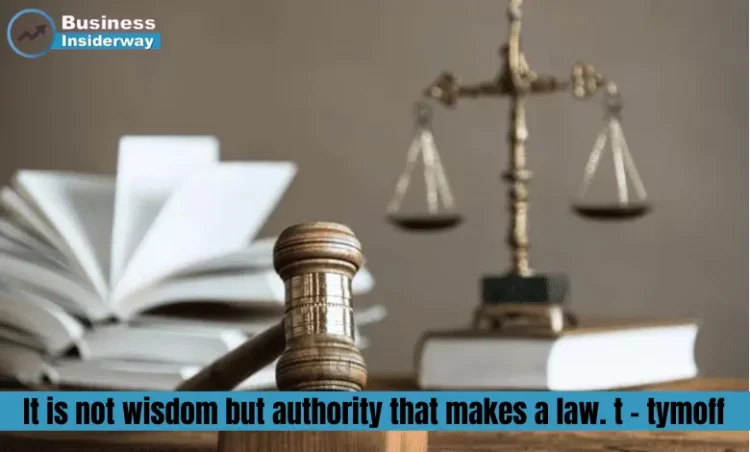Introduction It is not wisdom but authority that makes a law. t – tymoff
It is not wisdom but authority that makes a law. t – tymoff! Have you ever pondered the age-old question: wisdom or authority genuinely shapes our laws? Dive into a thought-provoking journey as we unravel the essence of lawmaking through the lens of Tymoff’s profound statement: “It is not wisdom but authority that makes a law.” Let’s navigate the intricate dance between knowledge and power in the realm of legislation, discovering how these forces intertwine to sculpt our legal landscape. Are you ready to challenge your perceptions and explore the dynamic interplay between wisdom and authority in shaping our society’s rules?
Understanding the Difference between Wisdom and Authority
Wisdom and authority play distinct roles in the realm of lawmaking. Wisdom embodies knowledge, experience, and sound judgment. It reflects understanding right and wrong based on ethical principles and logical reasoning. On the other hand, authority represents power, control, and the ability to enforce rules.
While wisdom is rooted in intellect and moral values, authority often stems from positions of influence or dominance. Laws crafted with wisdom prioritize fairness, justice, and societal well-being. They aim to create a harmonious balance between individual rights and collective responsibilities.
In contrast, laws driven by authority may focus more on maintaining order through compliance rather than seeking genuine justice. Understanding this disparity is crucial for evaluating the effectiveness and legitimacy of legal systems worldwide. Striking a balance between wisdom’s insightfulness and authority’s enforcement capabilities is essential for creating laws that genuinely serve society.
The Role of Wisdom in Making Laws

Wisdom plays a crucial role when making laws, ensuring that decisions are based on sound judgment and foresight. Wisdom allows lawmakers to consider the long-term implications of their actions, considering the well-being of society as a whole. From experience and knowledge, wise individuals can craft laws promoting justice, equality, and progress.
Wisdom also enables lawmakers to anticipate challenges and adapt laws to changing circumstances. By incorporating ethical principles and moral values into legislation, wisdom helps maintain societal harmony and stability. It empowers legislators to address complex issues with empathy and understanding, leading to more effective outcomes for all members of society.
In essence, the role of wisdom in making laws is fundamental in shaping a legal framework that reflects a community’s collective values and aspirations. It serves as a guiding light in navigating the complexities of governance while upholding the principles of fairness and integrity.
The Influence of Authority in Lawmaking
Authority plays a significant role in the process of lawmaking. It can enforce and regulate rules within a society, shaping its norms and values. When authority is utilized wisely, it can uphold order and promote justice. However, when authority is misused or abused, it can lead to oppression and injustice.
In lawmaking, those in positions of authority can set regulations that impact individuals’ lives daily. Whether at a local, national, or international level, laws created by authorities have far-reaching consequences shaping communities.
The influence of authority in lawmaking cannot be underestimated. It can establish standards of conduct, protect rights, and maintain social cohesion. As such, balancing utilizing authority effectively while considering ethical principles is crucial for creating just and fair laws that benefit society.
Examples of Laws Based on Wisdom and Authority
When we look at laws based on wisdom, we think of regulations rooted in society’s collective knowledge and experience. For instance, laws promoting environmental conservation or public health reflect a deep understanding of how our actions impact the world around us.
On the other hand, laws based on authority often stem from a more hierarchical structure where rules are enforced simply because those in power dictate them. An example could be strict censorship laws imposed by authoritarian regimes to control information flow and maintain their grip on power.
In contrast, wise legislation is crafted considering long-term benefits and the well-being of all individuals. Think about policies that promote equality, justice, and sustainability – these are often born out of wisdom rather than mere authority.
Finding a balance between enacting laws grounded in wisdom and those driven by authority is crucial for creating a thriving, fair society.
The Impact of Wisdom vs Authority in Society
When considering the impact of wisdom versus authority in society, it becomes evident that both play crucial roles in shaping our legal systems and governance.
Wisdom brings a deep understanding of human nature, morality, and justice. Laws rooted in wisdom are often based on ethical principles and aim to promote societal fairness and equality.
On the other hand, authority holds the power to enforce laws and maintain order. While authority can ensure compliance with regulations, it may sometimes need more depth of insight than wisdom provides.
In society, striking a balance between wisdom and authority is critical to creating laws that are not only just but also effectively implemented. When combined harmoniously, these elements can lead to a legal system that fosters respect for the rule of law while upholding fundamental values.
Conclusion: Striking a Balance between Wisdom and Authority in Lawmaking
Striking a balance between wisdom and authority in lawmaking is crucial for creating just and effective laws that benefit society. While wisdom provides the moral compass and ethical foundation for laws, authority ensures their enforcement and implementation.
By recognizing the value of wisdom and authority in the legislative process, lawmakers can draft laws that are grounded in ethical principles and practical to enforce. This delicate balance helps uphold justice, promote equality, and maintain social order.
Essentially, it is not solely wisdom or authority that should dictate lawmaking but rather a harmonious blend of both. Only by integrating these two elements can we create a legal framework that genuinely serves the greater good and upholds justice for all members of society.














